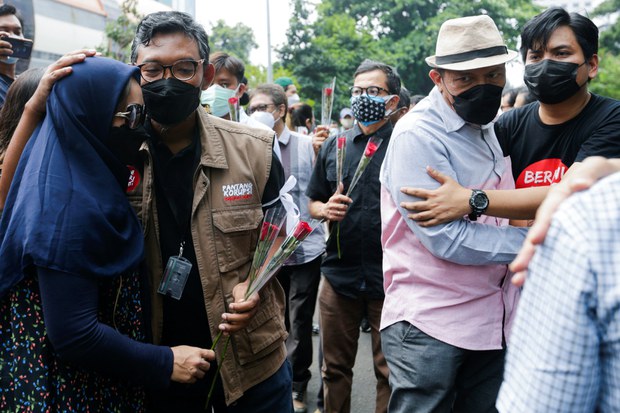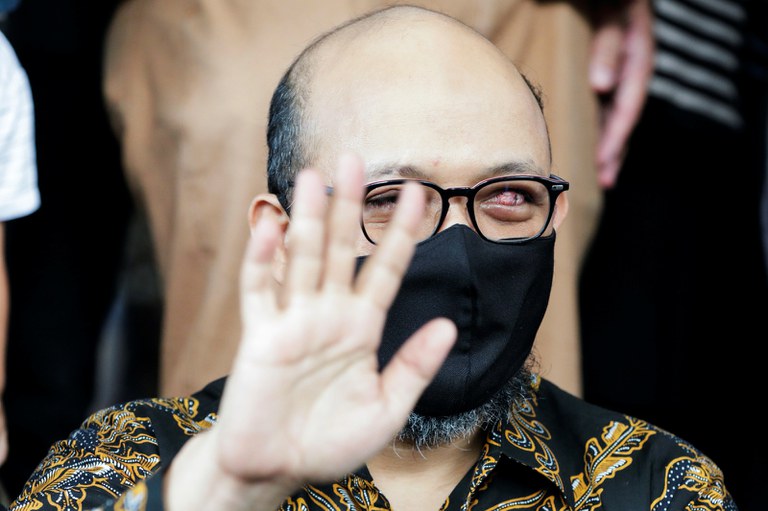Sacked Employees of Indonesia’s Anti-Graft Agency Bid Farewell
2021.09.30
Jakarta
 Former KPK employees are welcomed by relatives after exiting Indonesia’s anti-corruption agency (KPK) building, following their firing after being declared unqualified in a controversial civil service exam, in Jakarta, Sep. 30, 2021.
Former KPK employees are welcomed by relatives after exiting Indonesia’s anti-corruption agency (KPK) building, following their firing after being declared unqualified in a controversial civil service exam, in Jakarta, Sep. 30, 2021.
Dozens of employees and investigators who were fired from their posts at Indonesia’s anti-corruption agency after they failed a civics exam vowed Thursday to keep fighting against graft, during an emotional rally on their last day on the job.
The government has offered the 57 dismissed staffers – including investigators who had handled major cases – jobs with the national police, amid a public outcry and allegations that they were terminated as part of efforts to undermine and sideline the once independent Corruption Eradication Commission (KPK).
Yudi Purnomo, a former KPK investigator and chairman of its workers’ union, was teary-eyed as he reminisced on his 14-year career at the agency.
“I haven’t decided where I’m going, but for sure I will continue to work for this country,” Yudi told reporters, after the staffers laid their name tags on the ground outside KPK headquarters in Jakarta.
“My journey may have stopped for now, but the spirit of eradicating corruption must not die.”
Since it was established in 2002, the KPK has secured the convictions of former ministers, governors, central bankers, legislators, and tycoons, making it one of the most respected and feared institutions in Southeast Asia’s largest country.
In May, the National Civil Service Agency (NCSA) announced that 75 KPK employees had failed the so-called National Outlook Test, which was required for them to keep their jobs. Critics have likened the exam to an ideological purity test, alleging it was designed to get rid of the agency’s most veteran graft investigators.
The employees were required to pass the test as KPK transitioned from an independent institution to one under the executive branch of the government. It was mandated after amendments to a law governing the KPK.
The test that KPK employees took was different from the standard entry test required of applicants to the civil service because the KPK staffers were more senior-level government employees, according to NCSA.
Those who took the test said interviewers asked questions about their views on homosexuality and the government’s decision to ban the hardline Islamic Defenders’ Front, or whether they were willing to remove their hijab if requested as part of their job’s dress code.
The amendments that brought the agency under the control of the executive branch were passed by the Indonesian parliament in 2019. It provoked street protests, where opponents accused the government of using the law to weaken the independence of the agency fighting corruption in a country notorious for widespread graft.
In May, the Constitutional Court rejected a petition filed by former KPK commissioners to overturn the amended law.
Busyro Muqoddas, who headed the commission from 2010-2011, said Thursday that the firing was “legally and morally flawed.”
“I’m convinced that the current KPK regime will not last long. It’s undergoing moral decay,” he told reporters.
Of the 75 employees, 57 failed on questions which they had to answer correctly and for which they would have no opportunity to retake the test, while the remaining 18 could stay on at the agency provided that they were willing to receive further “guidance,” according to NCSA.

Among those fired is Novel Baswedan, who was permanently blinded in his left eye when perpetrators threw acid in his face in 2017 during an attack, which he believes was related to one of his many investigations.
Baswedan and six other investigators who failed the test have handled significant corruption cases involving powerful senior politicians and police generals, including an ongoing probe involving two former members of President Joko “Jokowi” Widodo’s cabinet.
Novel was the lead investigator in a corruption scandal surrounding a national electronic identity card project, which cost the state 2.3 trillion rupiah ($163 million). It led to the political downfall of then-parliament Speaker Setya Novanto, who lost the position before being sentenced to 15 years for his role in taking kickbacks.
Last year, a Jakarta court convicted and sentenced two low-ranking police to two years and 18 months in prison, respectively, for the acid attack following a trial, which Novel himself and rights groups denounced as farcical.
Offers of new jobs
On Wednesday, national police chief Gen. Listyo Sigit Prabowo said he had sent a letter to Jokowi proposing to hire the former KPK staffers to work as civil servants in the force, because they could strengthen the police force’s fight against corruption within the institution.
“Their track record and experience in fighting corruption are useful in strengthening the police as an organization,” Listyo said in a statement.
Mohammad Mahfud MD, the coordinating minister for political, legal, and security affairs, later said Jokowi had approved the police chief’s proposal.
“The controversy… can now be put to an end,” he tweeted.
Meanwhile, the chief of criminal investigations at the national police, Commissioner Gen. Agus Andrianto, said that the dismissed employees would not be able to work as investigators at the force.
“Based on the law on the police, investigators and assistant investigators shall be members of the National Police, not civil servants,” he told CNN Indonesia on Wednesday.
A former KPK director, Giri Suprapdiono, said he had not decided whether to accept the police’s offer.
“There are many questions and things that need to be clarified regarding the plan,” Giri told BenarNews.
Boyamin Saiman, who leads the NGO Anti-Corruption Society (MAKI), said the offer only demonstrated the government’s inconsistency.
“Now that the national police chief wants to hire them, it means that that the National Outlook Test was meaningless. If they were deemed to have failed, why is the police chief recruiting them?” Boyamin told BenarNews.







